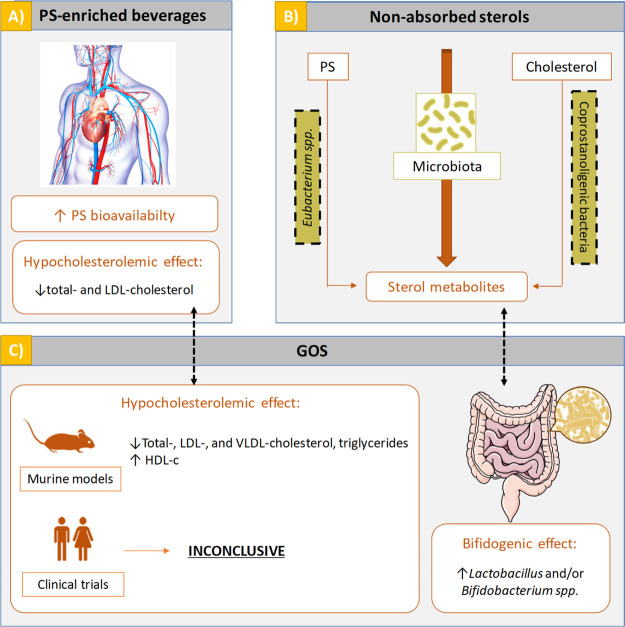Figure 1.
Possible interaction between PSs and GOSs (absorption and metabolism). (A) Hypocholesterolemic effect after the regular consumption of PS-enriched milk-based fruit beverages has been confirmed in postmenopausal women as well as an increase in the bioavailability of PS.8,9 (B) Nonabsorbed sterols (PS and cholesterol) are susceptible to biotransformation by the action of the microbiota into sterol metabolites. Among the microbial species associated with this process, Eubacterium spp. has been the only one related to PS metabolism. With respect to cholesterol, different bacteria have been associated (Eubacterium spp., Bacteroides spp., Bifidobacterium spp., Clostridium spp., and Lactobacillus spp.), all of which are referred to as coprostanoligenic bacteria.11 (C) In the present study, the addition of GOS to PS-enriched beverages was proposed aiming at improving the functionality of this food matrix. On the one hand, the major health benefit associated with the consumption of GOS is their ability to selectively stimulate the growth of specific members of the gut microbiota. In particular, they are highly specific in increasing the microbial population of Bifidobacterium spp. and Lactobacillus spp.,15 coprostanoligenic bacteria as abovementioned. We hypothesize that this modulation of the microbiota exerted by the presence of GOS could modify sterol metabolism. In the other hand, information regarding the effect of GOS on the serum lipid profile is scarce. Studies in murine models have shown that consumption of GOS for 3–8 weeks is able to improve the lipid profile.16−18However, in clinical trials lasting 6–12 weeks, the results are inconclusive.19,20 Moreover, their possible interference with PS absorption is unknown. Thus, the present work sheds light on the influence of the prebiotic upon hypocholesterolemic effect of the PS-enriched beverages and sterol bioavailability.

